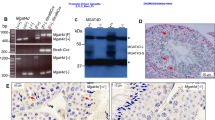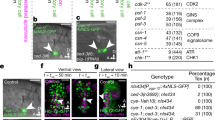Abstract
WHEN eggs of Trichogaster trichopterus var. sumatranus (Teleostei : Anabantidae) are subjected to + 39/40° C. for 3–6 min., mitosis is temporarily halted, being resumed immediately once the egg? are brought back to normal temperature (+ 27° C.). At temperatures of 40.5/42° C. for 3–7 min. mitosis is halted, while the mitotic structures are changed to an extent which necessitates a re-organization after the termination of the heat shock before mitosis can be resumed. At still higher temperatures similar changes are invoked by the heat treatment, but with increasing temperatures the eggs rapidly lose the property of post-blocking restitution.
This is a preview of subscription content, access via your institution
Access options
Subscribe to this journal
Receive 51 print issues and online access
$199.00 per year
only $3.90 per issue
Buy this article
- Purchase on Springer Link
- Instant access to full article PDF
Prices may be subject to local taxes which are calculated during checkout
Similar content being viewed by others
References
Ris, H., and Mirsky, A. E., J. Gen. Physiol., 32, 489 (1949).
Author information
Authors and Affiliations
Rights and permissions
About this article
Cite this article
BERGAN, P. Blocking of Mitosis by Heat Shock. Nature 186, 905–906 (1960). https://doi.org/10.1038/186905a0
Issue Date:
DOI: https://doi.org/10.1038/186905a0
Comments
By submitting a comment you agree to abide by our Terms and Community Guidelines. If you find something abusive or that does not comply with our terms or guidelines please flag it as inappropriate.



